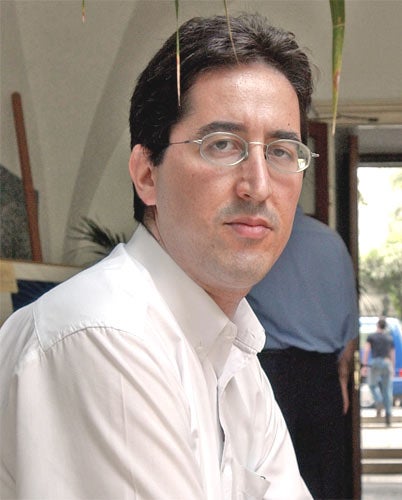Secret trial revelations prompt US-Israeli diplomatic storm
Blogger tells how US government spied on Israeli officials in Washington

Your support helps us to tell the story
From reproductive rights to climate change to Big Tech, The Independent is on the ground when the story is developing. Whether it's investigating the financials of Elon Musk's pro-Trump PAC or producing our latest documentary, 'The A Word', which shines a light on the American women fighting for reproductive rights, we know how important it is to parse out the facts from the messaging.
At such a critical moment in US history, we need reporters on the ground. Your donation allows us to keep sending journalists to speak to both sides of the story.
The Independent is trusted by Americans across the entire political spectrum. And unlike many other quality news outlets, we choose not to lock Americans out of our reporting and analysis with paywalls. We believe quality journalism should be available to everyone, paid for by those who can afford it.
Your support makes all the difference.A court case against a translator who leaked US government secrets was conducted in secret because it centred on the revelation that the FBI had eavesdropped on Israeli embassy phone calls, it was revealed yesterday.
The extraordinary limitations in place for the prosecution of Shamai Leibowitz, who was sentenced to 20 months in prison for disseminating classified information, meant that even the judge sentencing him did not know what he was supposed to have leaked. "All I know is that it's a serious case," Judge Alexander Williams said last year. "I don't know what was divulged other than some documents, and how it compromised things, I have no idea."
But now Richard Silverstein, the blogger to whom Leibowitz passed his information, has come forward to defend his source and in so doing has made public another source of difficulty in the strained US-Israeli relationship. Leibowitz passed him about 200 pages of verbatim records of phone calls and conversations between embassy officials, saying that he believed the documents revealed Israeli officials trying unlawfully to influence US policy and edging towards military action against Iran.
"I see him as an American patriot and a whistleblower, and I'd like his actions to be seen in that context," Silverstein told The New York Times. "What really concerned Shamai at the time was the possibility of an Israeli strike on Iran, which he thought would be damaging to both Israel and the United States."
He could not provide hard copies of the documents as he said he had burnt them when the case against Leibowitz came under investigation. But, he said, among the exchanges detailed was one where Israeli officials expressed their nervousness that they were being monitored. They also discussed their intention of drafting opinion pieces to be published under the names of prominent supporters. There has been dismay among civil liberties and open government advocates who point to pledges made by Mr Obama before his election to seek new transparency in Washington. Instead, his administration has launched a record number of prosecutions under the Espionage Act – five including the Leibowitz case. Previously, there had been only four such prosecutions opened by all previous administrations.
The government notably had egg on its face when a case against a former official of the National Security Agency, collapsed this summer. Thomas Drake had faced up to 35 years for leaking information exposing bungling at the agency to The Baltimore Sun. Most of the charges were dropped when the judge insisted that the leaked documents be shown to the jury.
"The government's penchant since September 11, 2001, for operating in secrecy and hiding behind an executive branch "state secrets" doctrine has damaged our long-term national security and national character," Mr Drake wrote in The Washington Post last week.
What seems odd in this latest case is that no one in Washington will be shocked to learn that the FBI keeps tabs on the Israeli embassy. Monitoring foreign missions, particularly to screen for spies, is common practice and legal if sanctioned by a special court in the Justice Department.
Leibowitz, meanwhile, seems to have been afflicted more by naiveté than ill-will. The leaked documents, which reportedly include conversations involving at least one US congressman, did appear to reveal lobbying by Israeli officials of Capitol Hill. But that is what diplomats are paid to do.
In addition to the prosecutions, the Obama administration classified more than 77 million government documents last year, a one-year increase of 40 per cent. This zeal to protect government business is in sharp contrast to Mr Obama's praise in 2008 of whistleblowers, whom he described as, "often the best source of information about waste, fraud, and abuse in government".
Join our commenting forum
Join thought-provoking conversations, follow other Independent readers and see their replies
Comments